At a recent event, Grower Nico Ammerlaan of Tomatoworld solved a problem with some faltering technology with a quip. The slides on the screen went faster than he wanted. Automatically. Nico immediately linked the automation of cultivation to data-driven cultivation. He does believe in that. "Growers like me, with 40 years of experience, they are becoming rare."
Nico Ammerlaan, Tomatoworld
Many growers filled the hall with over a hundred seats. It was a growers' event, the second after the first successful edition on energy in 2022. This time, the theme of the grower meeting was chosen: From Data to Practice: Making Plant Health and Energy Measurable in Daily Practice.
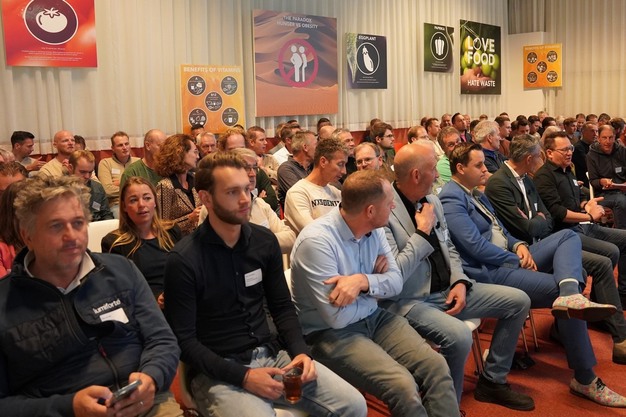
Hoogendoorn Growth Management, Kas als Energiebron , LetsGrow.com, Plant Empowerment, and Tomatoworld organized the grower meeting.
Grower Nico and the project partners behind the data-driven greenhouse at Zwethlaan in Honselersdijk work extensively with data and computers, although he likes to consider himself "the walking sensor of Tomatoworld". The experienced grower still prefers to feel the climate himself in the greenhouse. Since 9 October, a new lit-cultivation started up, partly made possible after installing dimmable LED lighting.
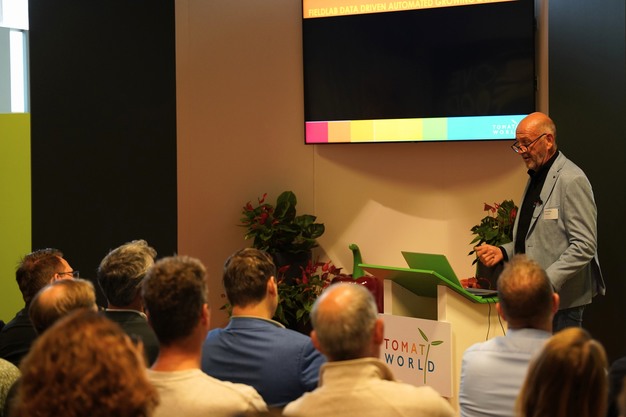 Nico solved the technical problems with a faltering screen with a quip
Nico solved the technical problems with a faltering screen with a quip
Further there were presentations by lobbyist Jesse Schevel of Glastuinbouw Nederland, Jan Opschoor on behalf of Van Iperen on CSRD, and Robert Bergenhenegouwen of Rosopro but also Greenport West-Holland on energy issues with a focus on grid congestion.
Robert Bergenhenegouwen discussed the importance of the right energy data to solve grid congestion, among other things. The sector needs to move from annual data to hourly or quarterly data to optimize. With the right data, there sometimes turns out to be more room on the grid than grid operators seem to realize, Robert Solleveld of Glastuinbouw Nederland added.
Baking bread
René Beerkens of Hoogendoorn raised whether the plant is the main factor in growers consideration's. He was referring to fluctuating energy prices, which sometimes tempt growers to act primarily on them. Quickly pumping some heat into the greenhouse early in the day, or switching on some light when prices are low, it happens. But what does it mean for the plant?
That is far from clear. Data is lacking, despite the availability of sensors that can measure certain aspects, a consultant from the audience remarked. René made the comparison with bread baking. With different inputs and different ingredients, different bread comes out of the oven.
It is the same for growers, who grow vegetables, fruit, flowers, and plants. "We have to help the plant to bake the most delicious bread possible," he says. Or more concretely, it takes data to cultivate in a balanced way. For some crops, crop registration is already advanced, but others absolutely aren't, says René. . Eventually, robots will be able to collect that data, but for now, it is a task for humans.
René Beerkens, Hoogendoorn Growth Management
"Don't report too much"
In any case, Thursday afternoon showed once again that humans, growers, and certainly suppliers in the room, have some work to do when it comes to data. Lobbyist Jesse discussed European politics. "90-95% of policy is European," he said.
Jesse explained why data is a complex issue in Europe. By no means all member states are equally advanced. In the Romanian or Spanish countryside, farmers do not always have internet. And does everyone want to provide data on everything? On behalf of Glastuinbouw, the lobbyist called on the audience to set a good example, to strengthen the Netherlands' competitive position. But it is also important that growers don't report too much so that they can keep growing, he says.
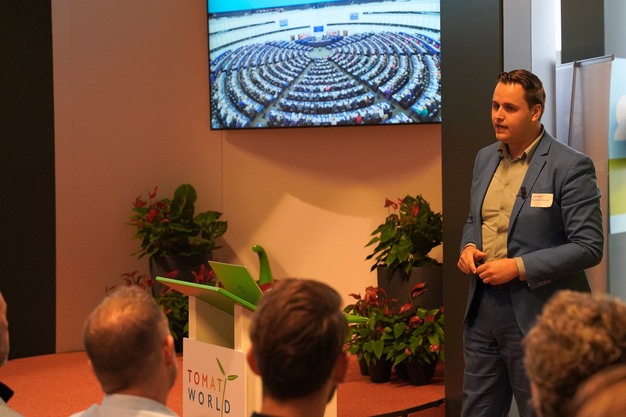 Jesse Schevel
Jesse Schevel
A positive spin on data obligation
After Jan Opschoor's talk on CSRD (the Corporate Sustainability Reporting Directive), some people were alarmed about 'reporting each other to death'. Mandatory reporting on sustainability and CO2 emissions, from yourself but also further down your chain, will have a major impact. Catching up is necessary, and Jan recommends bringing in experts to do so.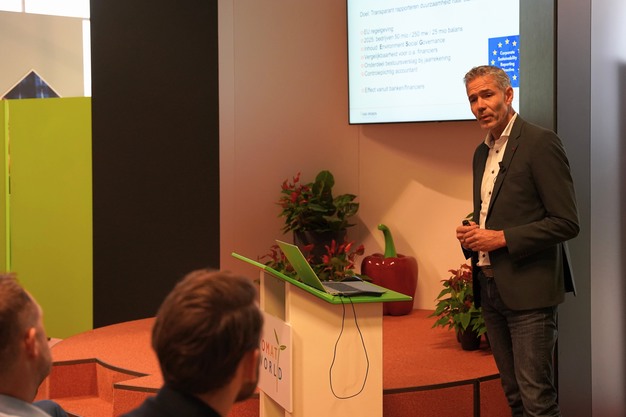 Jan Opschoor spoke on behalf of Van Iperen
Jan Opschoor spoke on behalf of Van Iperen
Like Jesse, Jan also gave it a positive spin. Use CSRD to professionalize yourself as a company. And, he warned, try not to do too much at once. Behind the 90 ESG (Environmental, Social & Governance) criteria, there are potentially 1100 data points. Van Iperen, for instance, has mapped the footprint of all its fertilizers.
Sooner or later, it will be everyone's turn. Indeed, Scope 3 of the CSRD scope added an obligation to look at the entire chain, from customer to supplier. In that respect, it is good that greenhouse horticulture has already proactively started working with various footprint tools, Jan complimented the sector. He mentions the Horti Footprint Calculator and FloriPEFCR. Those tools are going to help growers be able to calculate, and benchmark, their footprint.
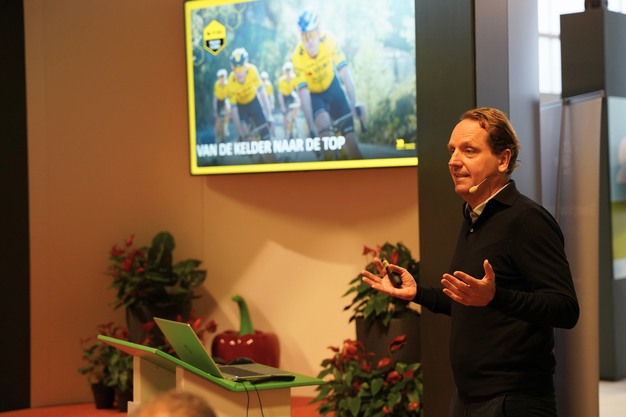
Merijn Zeeman
A parallel between cycling and horticulture
Robert Solleveld finally announced guest speaker Merijn Zeeman on behalf of Glastuinbouw Nederland following all the sector presentations. Until 1 October, he was sporting director of cycling team Visma Lease a Bike, and its predecessors. Since 1 December, he has been general manager at football club AZ. Merijn talked about how the cycling team climbed from the bottom to the top.
The audience interacted well with Merijn's presentation. There were plenty of questions, including trying to draw a parallel with horticulture. On the topic of data, there was a parallel with the Jumbo Foodcoach app, which the cycling team started working with. "That has really caused a huge acceleration in our performance," he says.
This summer, the team made headlines with the Control Room, a traveling data center that went with the team during races. "'. There is a lot of data, but it proved difficult to get it to the coach and the rider in the middle of the race, in the mountains. With the Control Room, the team has taken a step in this direction.
The greenhouse industry is also taking steps, although they may not make the news as easily. Yet there is a realization that with the help of data, steps must continue to be taken. Or as one grower said prior to the presentations: "If they start telling me later: 'We have to collect data', I'll be gone soon. We are already doing that. We just need to do more with it."
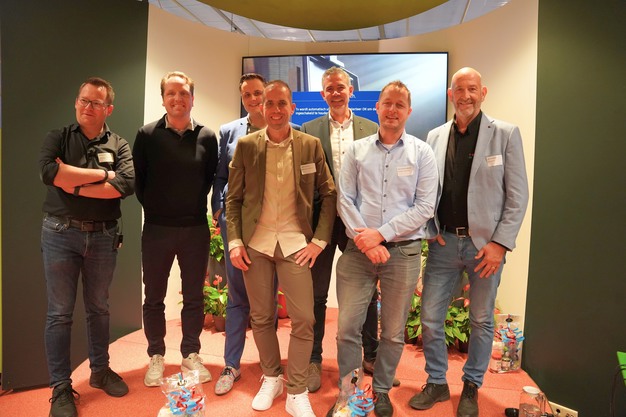
René Beerkens, Merijn Zeeman, Jesse Schevel, Robert Solleveld, Jan Opschoor, Robert Bergenhenegouwen and Nico Ammerlaan
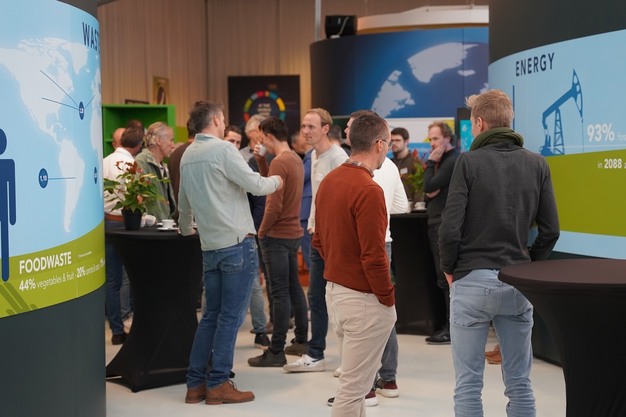
Photos: Valerie Kraak/GroentenNieuws
